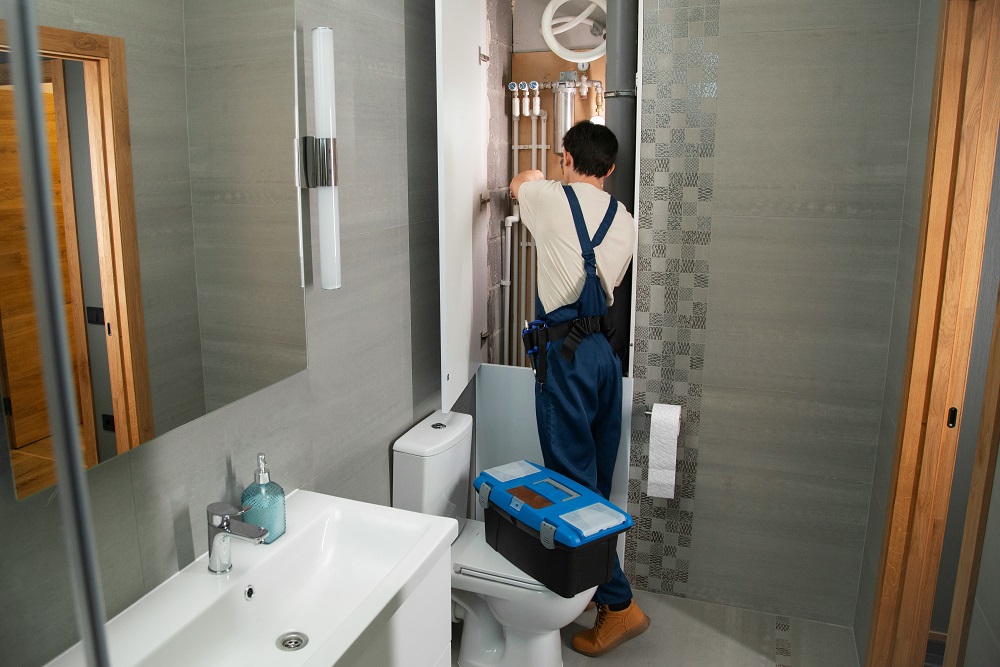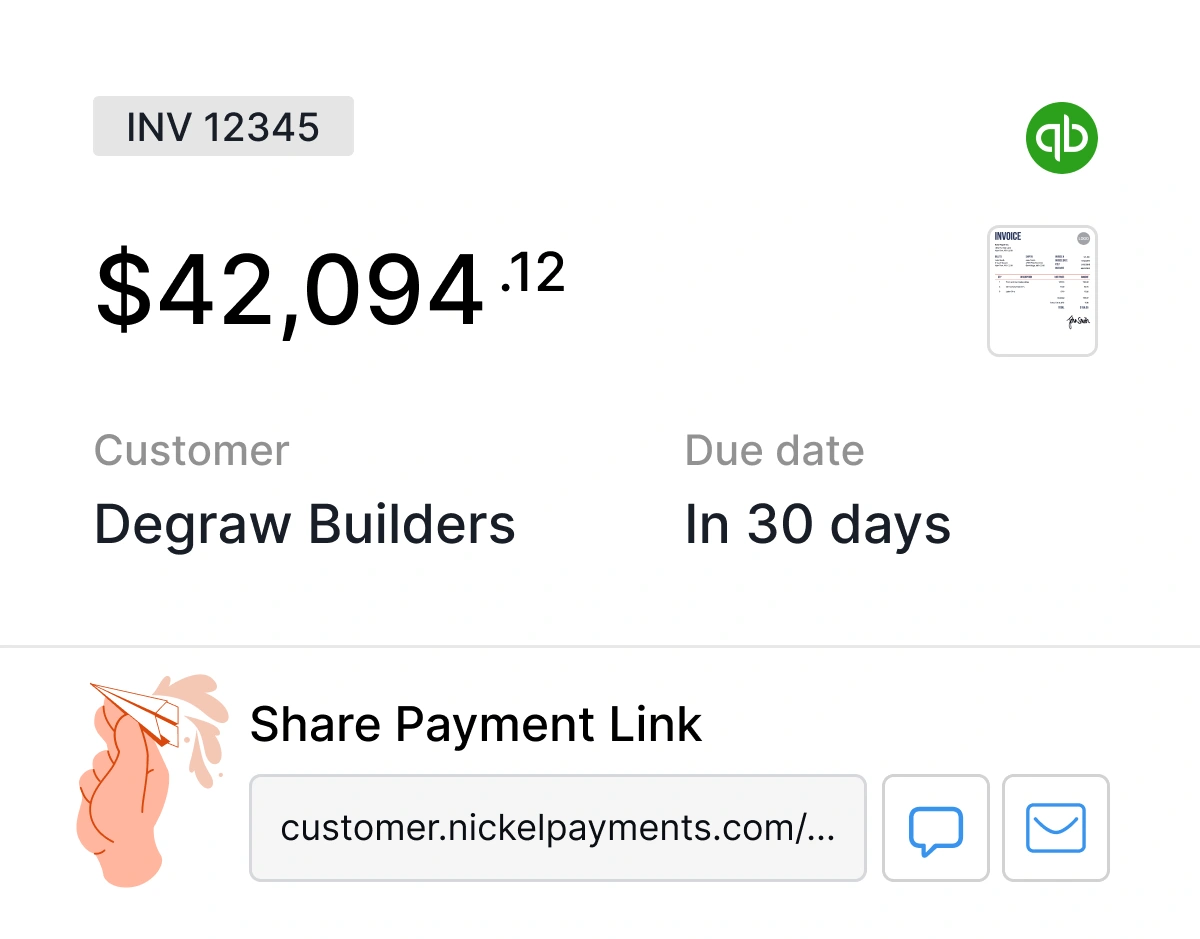Invoicing for Plumbers Made Easy
Power up your cash flow with payments that actually work for plumbing professionals

Trusted by 10,000+ industrial small businesses














































Why Plumbers Are Switching to Nickel
Unlike traditional payment processors that treat you like a "high-risk" business, Nickel was built specifically for trade professionals who handle large invoice-based transactions. We understand that:
- $15,000 sewer line replacements are normal business, not suspicious activity
- Emergency calls create payment surges that banks often flag as unusual
- You need reliable processing during peak seasons like winter freeze periods
- Your cash flow depends on predictable payment timing, not arbitrary holds
Result: No surprise account holds, no "business verification" delays, no risk department calls.

Why Plumbers Are Switching to Nickel
Unlike traditional payment processors that treat you like a "high-risk" business, Nickel was built specifically for trade professionals who handle large invoice-based transactions. We understand that:
- $15,000 sewer line replacements are normal business, not suspicious activity
- Emergency calls create payment surges that banks often flag as unusual
- You need reliable processing during peak seasons like winter freeze periods
- Your cash flow depends on predictable payment timing, not arbitrary holds
Result: No surprise account holds, no "business verification" delays, no risk department calls.
Before Nickel vs. After Nickel
- Complex workflows
Multiple systems for invoicing, payments, and bookkeeping - Account holds
Banks freeze accounts over routine $15,000 water heater installations - Processing fees
Lose 1-3% on every transaction ($150-450 per typical job) - "High-risk" treatment
Banks don't understand plumbing business patterns - Manual reconciliation
Hours spent matching payments to invoices in QuickBooks
- One simple system
Everything integrated: invoicing, payments, and QuickBooks sync - Process large payments worry-free
We understand large and variable transactions are normal for plumbers and our support team is highly responsive if you ever run into issues - Zero fees on ACH
Keep 100% of what customers pay you - Built for plumbers
Designed around how your business actually works - One-click QuickBooks sync
Your invoices and payments automatically sync to the right customer, service call, and project, plus seamless AP integration
The Modern Plumber Payment Crisis
The plumbing industry faces unique financial challenges that generic payment processors simply don't understand. With 113,000 plumbing businesses competing for work and customers increasingly demanding flexible payment options, plumbers are caught between rising costs and shrinking margins.
Emergency Call Volatility:
Plumbing generates significant revenue from emergency calls, especially during winter months when pipes freeze and water heaters fail. These emergency jobs often involve large transactions - a burst pipe repair might cost $5,000, while a full water heater replacement runs $3,000-8,000. Traditional banks see these payment spikes as red flags, leading to account freezes right when you need cash flow most.
Equipment and Material Cost Pressure:
Plumbing projects frequently require purchasing materials or tools upfront before a job is completed and paid for. For instance, replacing a water heater or sewer line may involve thousands of dollars in materials that must be paid out of pocket before collecting payment from the client. When materials costs continue rising and customers expect net payment terms, plumbers are forced to finance their own customers - often for 30-60 days.
Commercial Payment Complexity:
Commercial plumbing work presents additional challenges with multiple decision-makers, approval processes, and extended payment cycles. A restaurant kitchen renovation might involve coordination between general contractors, property managers, and business owners, each adding delays to your payment timeline.
Seasonal Cash Flow Swings:
Unlike residential service calls, commercial plumbing projects cluster around specific seasons. Winter brings emergency repairs, spring sees renovation projects, and summer often slows down. Plumbing businesses often face unpredictable income due to fluctuating demand for services, making it challenging to maintain steady cash flow year-round.

The Modern Plumber Payment Crisis
The plumbing industry faces unique financial challenges that generic payment processors simply don't understand. With 113,000 plumbing businesses competing for work and customers increasingly demanding flexible payment options, plumbers are caught between rising costs and shrinking margins.
Emergency Call Volatility:
Plumbing generates significant revenue from emergency calls, especially during winter months when pipes freeze and water heaters fail. These emergency jobs often involve large transactions - a burst pipe repair might cost $5,000, while a full water heater replacement runs $3,000-8,000. Traditional banks see these payment spikes as red flags, leading to account freezes right when you need cash flow most.
Equipment and Material Cost Pressure:
Plumbing projects frequently require purchasing materials or tools upfront before a job is completed and paid for. For instance, replacing a water heater or sewer line may involve thousands of dollars in materials that must be paid out of pocket before collecting payment from the client. When materials costs continue rising and customers expect net payment terms, plumbers are forced to finance their own customers - often for 30-60 days.
Commercial Payment Complexity:
Commercial plumbing work presents additional challenges with multiple decision-makers, approval processes, and extended payment cycles. A restaurant kitchen renovation might involve coordination between general contractors, property managers, and business owners, each adding delays to your payment timeline.
Seasonal Cash Flow Swings:
Unlike residential service calls, commercial plumbing projects cluster around specific seasons. Winter brings emergency repairs, spring sees renovation projects, and summer often slows down. Plumbing businesses often face unpredictable income due to fluctuating demand for services, making it challenging to maintain steady cash flow year-round.
Simplified Modern Workflow
Send invoice (or use your existing invoicing)
Customer pays instantly via secure link
Payment auto-syncs to QuickBooks
Money hits your account in 2 business days
Built-in QuickBooks Integration
Your payments automatically sync to the right invoice, customer, and job. No more:
- Manual entry errors
- Mismatched payments
- End-of-month reconciliation nightmares
- Hunting through bank statements


Compare: Nickel vs. Other Payment Platforms
What This Means for Your Plumbing Business
Save Money
Zero ACH fees: Save $3,000-8,000 per year on a typical plumbing business No hidden costs: No setup fees, monthly fees, or surprise charges Early payment discounts: Get paid faster, capture supplier discounts
Save Time
Automated reconciliation: 3+ hours per week saved on bookkeeping Instant invoicing: Send payment links directly from job sites One system: Stop switching between payment apps, banking apps, and QuickBooks
Reduce Risk
Process large payments worry-free: We understand plumbing transactions and provide responsive support when needed Predictable processing: Money hits your account in 2 business days Secure payments: Bank-level security without the bank headaches
Plumbing Industry Payment Breakdown
The $126.4 billion U.S. plumbing industry faces unique financial pressures that traditional payment processors weren't designed to handle.
Market Fragmentation:
With 113,000 plumbing businesses operating in the United States, 89% are small businesses with fewer than 20 employees. These smaller operations lack the leverage to negotiate better payment terms with banks or processors, often getting stuck with high fees and restrictive policies designed for larger enterprises.
Service Call Economics:
The average plumbing service call ranges from $200-800 for labor alone, with materials adding significantly more. It costs customers between $200 and $800 for plumbing labor. It can cost up to $16,000 to replace the entire plumbing system for a 2,000-square-foot home. When customers pay by credit card, processors typically charge 2.9-3.5% plus transaction fees, eating directly into already thin margins.
Equipment Financing Challenges:
Major plumbing equipment purchases require significant upfront investment. A professional drain cleaning machine costs $8,000-15,000, while a full service van setup can exceed $50,000. Traditional financing often doesn't understand the seasonal nature of plumbing work, making it difficult to secure equipment loans that align with cash flow patterns.
Workforce Payment Complexity:
The plumbing industry in the U.S. currently employs 564,000 people with the U.S. expected to be short 550,000 plumbers by 2027. This labor shortage forces plumbing businesses to offer competitive wages and benefits, putting additional pressure on cash flow management. When customer payments are delayed, meeting payroll becomes a constant stress point.

Plumbing Industry Payment Breakdown
The $126.4 billion U.S. plumbing industry faces unique financial pressures that traditional payment processors weren't designed to handle.
Market Fragmentation:
With 113,000 plumbing businesses operating in the United States, 89% are small businesses with fewer than 20 employees. These smaller operations lack the leverage to negotiate better payment terms with banks or processors, often getting stuck with high fees and restrictive policies designed for larger enterprises.
Service Call Economics:
The average plumbing service call ranges from $200-800 for labor alone, with materials adding significantly more. It costs customers between $200 and $800 for plumbing labor. It can cost up to $16,000 to replace the entire plumbing system for a 2,000-square-foot home. When customers pay by credit card, processors typically charge 2.9-3.5% plus transaction fees, eating directly into already thin margins.
Equipment Financing Challenges:
Major plumbing equipment purchases require significant upfront investment. A professional drain cleaning machine costs $8,000-15,000, while a full service van setup can exceed $50,000. Traditional financing often doesn't understand the seasonal nature of plumbing work, making it difficult to secure equipment loans that align with cash flow patterns.
Workforce Payment Complexity:
The plumbing industry in the U.S. currently employs 564,000 people with the U.S. expected to be short 550,000 plumbers by 2027. This labor shortage forces plumbing businesses to offer competitive wages and benefits, putting additional pressure on cash flow management. When customer payments are delayed, meeting payroll becomes a constant stress point.
Ranked #1 Easiest to Use Payment Solution by G2
See why Nickel outranks every major competitor, including Forwardly, Melio, and Square
Get Started in Minutes
No contracts. No setup fees. No risk.
Sign Up (2 minutes)
Connect QuickBooks (1 click)
Start Getting Paid (immediately)

Ready to Fix Your Payment Problems?
Stop losing money to fees and time to complicated workflows. Join thousands of contractors who've already made the switch.








